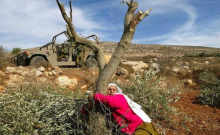MPPM celebrates Palestinian Land Day
March 30 is Palestinian Land Day. On this day, in 1976, Israeli repressive forces killed six Palestinian citizens of Israel who were protesting against the expropriation of land owned by Palestinians, in the North of the State of Israel, in order to settle Jewish communities there.
About 100 people were injured and hundreds were arrested during the general strike and in the large protest demonstrations that took place on that day in different Palestinian localities in Israel.
Since then, this date has been celebrated as Palestinian Land Day, symbolizing the determination of Palestinians — on both sides of the Green Line, in the refugee camps and in the diaspora — to preserve their history and defend their land as an essential element of their identity and their very existence as a people.
Forty-five years later, the situation of the Palestinian people has not improved, but is getting worse every day. Israel is intensifying the colonization of the territories occupied in 1967, using coercion and violence, while continuing the ethnic cleansing of the Palestinian population throughout historic Palestine.
Israel has enjoyed absolute impunity and even enjoys a privileged status in its relationship with the European Union. But, despite the actions and omissions of the international community, Israel is not a "normal" state.
MPPM marked the date yesterday, in a joint initiative with the UPP – Popular University of Porto and the CPPC – Portuguese Council for Peace and Cooperation, with a videoconference moderated by Kátia Castro, from the UPP Board. Jorge Cadima, from the National Directorate of MPPM, and Ilda Figueiredo, President of the CPPC, participated in the videoconference.
The session began with the screening of the documentary How Palestine Became Colonized, directed by Abby Martin for Telesur, which reviews the long history of the Zionist colonization, territorial expansion, and the expulsion of the indigenous inhabitants of Palestine.
Jorge Cadima began by recalling the efforts that the Palestinians have made to find a peaceful solution to the Palestinian question but have faced repeated violations of the agreements by Israel, with the brutal occupation and the fragmentation of the Palestinian territory, recalling the bantustans of apartheid South Africa.
He said that the optimism concerning the replacement of Trump by Biden in the presidency of the United States was not justified: Biden keeps the US embassy in Jerusalem and has not backed down from recognizing Israel's annexation of the Golan Heights.
Understanding the current situation is inseparable from the historical context in which the struggle for control of the Middle Eastern resources takes place. And if the creation of the State of Israel follows the Second World War, the plans for the occupation of the Middle East began to be drawn up in the First World War (McMahon's promises to the Arabs, Lord Balfour's promises to the Jews, Franco-British Sykes-Picot agreement).
Jorge Cadima then showed several documents that prove destabilization manoeuvres in several countries in the Middle East, some of which involving the CIA and MI5, and even a plan to assassinate Yasser Arafat.
He praised the resistance of the heroic Palestinian people, to whom the international community keeps making promises and then betraying them.
He denounced the international campaign to criminalize solidarity with the Palestinian people and criticism of the State of Israel under the false pretext of anti-Semitism.
He ended by recalling the appeal launched by MPPM addressed to the Portuguese presidency of the Council of the European Union to recognize the State of Palestine according to international law and the relevant United Nations resolutions, and to develop an action with other Member States to act in this same sense, which had the initial adhesion of a significant number of individuals representing the most varied sectors of Portuguese life and which is open to public subscription.
Ilda Figueiredo also considers that Biden's Middle East policy is a continuation of Trump's. In addition to keeping the US embassy in Jerusalem, she recalled the concession made to Morocco to recognize its sovereignty over Western Sahara in return for the resumption of relations with Israel, and the failure to condemn Israel's aggression against Syria.
She stressed that the Palestinian question cannot be dissociated from what is happening in other countries in the region: Lebanon and Syria, but also Iran and Libya, and Yemen, the target of aggression from Saudi Arabia.
To illustrate the subordination of the UN to Israel, and not the other way around, she cited an episode that occurred during a trip as part of a European Parliament delegation in which they were prevented by UN soldiers from taking pictures on the Golan Heights because “Israeli soldiers were watching”.
She believes that, in order to continue to maintain the control, coming from colonial times, over the exploitation of the region's natural resources, there is collusion between the United States and EU countries.
Focusing on the occupation, she recalled that 85% of the Wall is built within Palestinian territory and mentioned the huge shortages in the refugee camps aggravated by Trump's cut to UNRWA funding.
She considered that, especially in a time of pandemic, the maintenance of boycotts and sanctions is inadmissible and deserving strong repulsion.
Ilda Figueiredo recalled the Meeting for Peace, in Setúbal, on June 5, promoted by CPPC and 11 other organizations, including MPPM.
She also announced two public events, on April 14th, in Lisbon, and on April 15th, in Porto, both at 6 pm. The theme is the struggle for Peace, against blockades and occupations, and to remind the Portuguese government of its duty to respect not only international law and UN resolutions, but also the Constitution of the Portuguese Republic.


